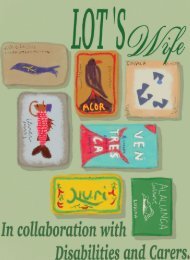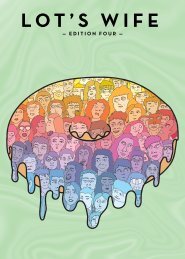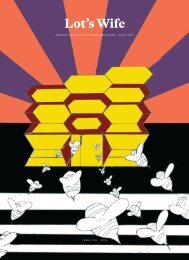Lot's Wife Edition 1 2016
You also want an ePaper? Increase the reach of your titles
YUMPU automatically turns print PDFs into web optimized ePapers that Google loves.
SCIENCE<br />
amounts can be enough to bring on symptoms like<br />
nausea, vomiting, skin rashes, and mouth ulcers.<br />
Continuing to eat gluten-containing products can<br />
further inflame the small intestine, stopping it from<br />
absorbing nutrients from anything else you eat,<br />
which can lead to nutrient deficiencies like anaemia.<br />
Not a coeliac?<br />
If you don’t have coeliac disease, but bread<br />
makes you bloat, it may not be gluten at all.<br />
According to a study published in Gastroenterology<br />
in 2013, the true culprit may be FODMAPs<br />
(Fermentable Oligosaccharides, Disaccharides,<br />
Monosaccharides and Polyols). These little guys are<br />
a group of simple carbs found in a number of foods,<br />
like wheat, milk, onions and garlic. FODMAPs can<br />
either ferment in your large intestine, making you<br />
bloat, or pull water into your bowels, which can make<br />
things move a little faster than you’d probably like.<br />
The researchers behind the paper studied 37<br />
participants who displayed irritable bowel syndrome<br />
symptoms (constipation, gas and diarrhoea,)<br />
and believed gluten to be the cause of them. The<br />
subjects were placed on a low-FODMAP diet for 2<br />
weeks, then placed on either a high-gluten, lowgluten<br />
or placebo (no gluten) diet for one week to<br />
give any possible symptoms a chance to develop.<br />
After the first two weeks, symptoms decreased<br />
for everyone involved. They then got worse for all<br />
participants in that final week, regardless of what<br />
diet they were on.<br />
While this study shows great results for a<br />
low-FODMAP diet, and takes the blame off gluten,<br />
it should be treated as nutrition ‘breakthroughs’ in<br />
general should - with a healthy dose of scepticism.<br />
Due to the small sample size and the fact that it<br />
can be difficult to control for every possible variable<br />
(like participants’ stress levels, or how much they<br />
exercise) it can be hard to establish any sort of<br />
causal relationship.<br />
So, gluten’s not all bad. But is it actually any<br />
good? Gluten in itself is almost pure protein, hence<br />
its occasional use as an imitation meat. However, it<br />
lacks the vitamins and minerals that meat, fish and<br />
legumes can provide. So, it’s pretty good if all you’re<br />
interested in is adding to your gains, but if you’re<br />
looking for meat substitutes for every day, it won’t<br />
give your body what it needs.<br />
GLUTEN-FREE FOODS<br />
Foods that are naturally gluten-free include<br />
potatoes, rice, corn, fresh meats, fruits and<br />
vegetables. These may or may not be labelled glutenfree<br />
on the supermarket shelf, but they naturally<br />
contain no gluten and are safe for a coeliac to eat.<br />
Supermarkets are now full of gluten-free<br />
versions of packaged foods, like instant noodles,<br />
pizzas and biscuits. It’s easy enough to believe that<br />
these are better for you than their gluten-containing<br />
alternatives, since they can be found in the health<br />
foods aisle of your supermarket, and their packaging<br />
is littered with tick motifs (so officially healthy!),<br />
pictures of leaves (so close to nature!) and phrases<br />
like ‘naturally good’ or ‘superfood’ (so utterly<br />
meaningless!).<br />
These health claims don’t amount to much,<br />
and unless you’re a coeliac or allergic to wheat,<br />
a product’s gluten-free labelling is no indication<br />
that it’s any good for you. A chocolate muffin is a<br />
chocolate muffin, whether it contains gluten or not.<br />
All in all, whether it’s being demonised or<br />
fiercely defended, gluten is even more overrated<br />
than The Great Gatsby. So, if you aren’t a coeliac<br />
sufferer, and you heed your grandmother’s advice<br />
about eating well (Eat more vegetables. Don’t put<br />
something in your mouth if you can’t pronounce it.<br />
Drink plenty of water. Sriracha can make anything<br />
taste good), then neither the presence nor absence<br />
of gluten in your diet will do you any real nutritional<br />
harm. By the time biology and chemistry have<br />
caught up with researching the food crazes we’re all<br />
about now, the foodie universe will have moved on<br />
from gluten anyway. We’ll probably all be losing our<br />
minds over the weight-loss benefits of a completely<br />
chemical-free diet by then.<br />
42 | Lot’s <strong>Wife</strong>

















